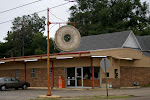Postmodernism: According to William Truett Anderson, it is marked by an overall confusion about who we are, who we can be, where we are going, and what we will be. Our reality is socially constructed. Our identities are up for grabs--we can "buy" any image we desire in this postmodern world. Drawbacks? Well--it is rather difficult to step outside of the air I breathe, but I hope that I don't fall victim to the popular notion that everything is relative--that there is no Truth, only truth. On the other hand, I like the idea that we can create the kind of world we live in by our words and actions. That institutions are not eternal but are man made and so can be unmade if they are not serving the needs of those who created them. As Anderson points out, "As more people suspect that reality can be created, the world becomes a kind of theater in which competing groups offer competing plots" (12), although there is a dark side to this kind of story creating. In this postmodern world, we have access to technology that extends the boundaries of our identities in ways folks fifty years ago would never have dreamed of. As Jones says in "Identity's Edge," "...to be alive--to be human--you must let certain things in" (541). I like the way Facebook lets us do that. I like the fact that I can go on Facebook and see pictures that my friend, Fatih, posts from Turkey. I like that I can see my friends in England at their parties after a soccer game. I like that I can share parts of my life with family that I may never see in person again on this earth. We can still be connected. Identity is shaped by interactions with the culture at large--whether it be through religion, education, family, business, media, etc. And as individuals connect with each other, ideas spread in and around and constantly create and recreate culture. Perhaps what is postmodern is that the rules have changed....
Subscribe to:
Post Comments (Atom)





No comments:
Post a Comment